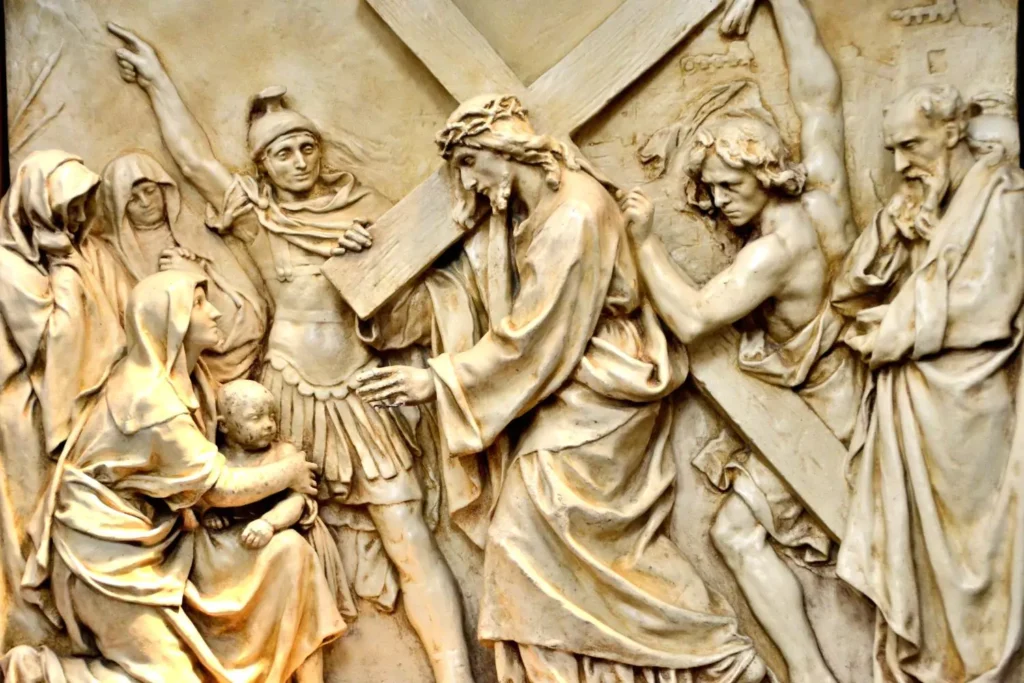A few years ago I had a conversation with a Christian leader about the kinds of songs we should be singing in worship. I suggested we needed more songs that referenced the cross of Christ and all it means. His response was dismissive. “Matt Redman has written enough songs about the cross for all of us.”
I was stunned. I’m a big Matt Redman fan and think he’s made a huge contribution to songs that explore the significance of the cross. But I strongly disagreed with my friend.
I grew up in a religious tradition where, week after week, the body of Christ hanging on a cross was prominently displayed at the front. Whenever I looked up at the pained face of Jesus I felt a mixture of sorrow, wonder and joy. I wasn’t quite sure what it all meant, but I thought that if Jesus had gone to all that trouble to die for me, I surely owed Him something.
But much of the time, I was completely unaware and unaffected by the cross, even though it was right in front of me every Sunday. It blended into the background of the stained glass windows, the wooden pews and the stone floor.
I think what I experienced growing up isn’t unlike what many of us go through today. The cross is somewhat peripheral to our encounters with God, either because we’re not quite sure what it means or because we rarely think about it.
I started becoming aware this was a problem when I read through the lyrics of a few worship CDs and found only two or three references to Jesus dying for us. There were even fewer explanations of what it means. I’ve experienced the same phenomenon in times of worship when a worship leader barely references or helps us understand the centrality of Christ’s work in our faith and lives.
Thankfully, the tide is changing. Song writers like Steve Fee, Stuart Townend, Paul Baloche and others are seeking to fill the gap of cross-less worship songs. But singing more songs about the cross doesn’t mean we understand what they mean or why it’s so important. Which is what I want to take a few moments to explore.
The truth of the cross
For some, the cross is a great sentimental story, kind of like ones we heard growing up. It’s moving, it’s dramatic, it’s inspiring. The truth is, it’s much more than that.
For others the cross is all about Jesus setting an example of service and sacrifice for us to follow. That’s exactly what the New Testament tells us in passages like Philippians 2:5-11 and 1 Peter 2:21. There’s certainly no greater example of selflessness to follow. But both of those passages go on to tell us that Jesus is much more than our example — He’s our Savior.
The cross can also be viewed as Jesus conquering all the evil in the universe, righting all the wrongs, and coming out on top. Kind of the super-hero model. We get to benefit from His victory, and worship is a celebration of being on the winning team. Again, true, but only part of the story.
Still others view the cross as an amazing display of love that points to our inestimable worth. This one is subtle. There is no more incredible display of love than the Son of God giving His life up to death on the cross. But it points not to the greatness of our worth, but the greatness of our sin. God loves us not because we are lovely, but because He is loving.
The primary purpose of the cross
No one illustration or analogy can fully explain everything that took place at Calvary 2000 years ago. But there is one explanation of the Savior’s death on the cross that provides the foundation for every other interpretation and helps us understand why the cross is central to our worship.
The primary purpose of the cross was to resolve the problem of sinful people drawing near to a holy God. Ever since Adam and Eve were expelled from the Garden, we’ve been unable to approach God on our own. Repeated sacrifices in the Old Testament reminded the Israelites of that fact. In the sacrifice of Christ, the wisdom of God devised a way to preserve the righteousness of God while displaying the love of God to those who deserved the wrath of God.
In other words, Jesus, fully God and fully man, fulfilled the commands of God for us through His righteous life and then endured God’s wrath against us at the cross.
Calvary means forgiveness for sins, the upholding of God’s righteousness, the satisfying of His wrath, the lavish display of His mercy, our adoption into God’s family, and His victory over sin, death and Satan.
The cross and our worship
So what does that mean for our worship? At least three things.
1. Jesus’ atoning work on the cross is our means of access
For centuries before Christ came, the high priest represented God’s people as he entered the Holy of Holies once a year to make atonement for sin. Now Jesus has entered the heavenly sanctuary to make full atonement for our sins and to tear down the veil that separated us from God.
The writer of Hebrews encourages us with these words,
“Therefore, brothers, since we have confidence to enter the holy places by the blood of Jesus, by the new and living way that He opened for us through the curtain, that is, through His flesh, and since we have a great priest over the house of God, let us draw near …” (Hebrews 10:19-22a).
Speaking of Jesus, Paul writes, “For through Him we both have access in one Spirit to the Father” (Ephesians 2:18).
Apart from Christ’s finished work, we would have no access to God. To have no access means not only that we can’t get close — we can’t even get in. It reminds me of the times I’ve tried to enter a website I’ve visited before that requires a password. I just can’t remember what it is. I try my street name. Nope. I try my office password. Wrong again. In desperation, I start randomly typing. That doesn’t work either. Unless I know the exact combination of letters and numbers I originally set up, I’ll never see anything but “access denied.”
As our high priest and perfect sacrifice, Jesus is our password into God’s presence. This means no worship leader, no song, no band can ever “lead us into God’s presence.” I can’t sing, dance or prophesy my way into God’s presence. Worship itself can’t lead us into God’s presence! Only Jesus himself can bring us into God’s presence, and He has accomplished it through a single sacrifice that will never be repeated and will never lose its effect.
Of course, there are times we experience God’s presence in a more pronounced way than at other times. God sometimes makes a group of people aware that He is in their midst. It may be in response to a healing or God’s Word being powerfully preached. A holy awe fills the room, and everyone thinks, “God showed up!” Actually, we’re just more aware of Him.
At other times sensing God’s presence is the result of meditating on His love or His faithfulness in caring for us. As our focus changes, faith rises in our hearts. But feelings can be misleading. It might be the sound of the music that makes us think God is closer than He was 15 minutes ago. But in Christ we are as near to God as we’ll ever be.
2. Jesus’ atoning work on the cross makes our worship acceptable
God could reject our worship for a number of reasons. He specifically condemns acts of worship associated with idolatry, unbelief, disobedience and evil motives (Jeremiah 13:10; Exodus 32:22-24; Exodus 30:9; Jeremiah 7:21-26). But rehearsing this list shouldn’t lead us to think that our offerings of worship could ever be pleasing to God on their own. Try as hard as we like, our hearts and worship will never be completely pure before God.
The ultimate factor of acceptable worship is faith in and union with Jesus Christ. He is our perfect worship leader (Hebrews 2:12). Our spiritual sacrifices are “acceptable to God through Jesus Christ” (1 Peter 2:5). It is His sinless offering of worship that cleanses and perfects ours.
Nothing against skill, practice, complexity, nuance, volume, musicianship or passion. But only the finished work of Christ makes our offerings of worship acceptable in God’s eyes.
That doesn’t mean what we do in worship doesn’t matter to God. It does. But when we overemphasize our own actions in worship, we can create the impression that the things we do in and of themselves make our worship acceptable to God. We think God is especially pleased with our creative musical arrangements, our skilled performance or even our exuberant passion.
It’s not the excellence of our offering that makes our worship acceptable, but the excellence of Christ. We can’t worship the eternal Father apart from the eternal Son. He was able to offer His own righteous life as a perfect offering, because He had no sins of His own to die for (Hebrews 7:26). Even now He intercedes for us, saving us “to the uttermost” (Romans 8:34; Hebrews 7:25).
How do we know God loves and accepts us? By looking at Jesus Christ, beaten and bruised for our transgressions, giving up His life in our place on the cross. There will never be a greater proof or demonstration of God’s love.
It’s not uncommon for us to “feel” loved by God when we’re engaged in worship. But if that feeling isn’t rooted in the Gospel, it will be an elusive sensation. It’s not enough to sing songs about God’s love that produce warm feelings in our hearts. We need to remember the reality of Christ crucified.
If we focus on what God did 2000 years ago rather than just 20 minutes ago, we’ll eventually find our hearts ravished by His amazing love.
3. Jesus’ atoning work on the cross is the object of our adoration
Have you ever thought that singing about Jesus giving His life for us is more for new or young believers? Maybe we’re tempted to think that as we mature we’re supposed to “graduate” to themes like intimacy with God, the power of the Holy Spirit to heal, or world mission.
The hosts of heaven don’t share that perspective. Day and night they cry out, “Worthy is the Lamb who was slain, to receive power and wealth and wisdom and might and honor and glory and blessing!” (Revelation 5:12).
When Jesus appears as the Lion of the tribe of Judah in Revelation 5:5, God might have honored Him for his moral perfection; His teaching, miraculous healing powers; or His glorious resurrection. He might have called attention to His role in creating and sustaining the universe. But He doesn’t. Instead, He highlights His substitutionary sacrifice for our sins as the central reason He is worthy of worship. “Worthy are you … for you were slain, and by your blood you ransomed people for God from every tribe and language and people and nation” (Revelation 5:9).
In awe of the cross
With so many clear references to the priority of Jesus and His atoning work, it’s astounding how often we go through entire meetings with only passing references to what He’s accomplished through His life, death and resurrection. When we do mention Him in our songs or prayers, we often fail to elaborate on what He’s done. The hosts of heaven never seem to get tired of extolling the Lamb who was slain. Should we?
Copyright 2007 Bob Kauflin. All rights reserved.












